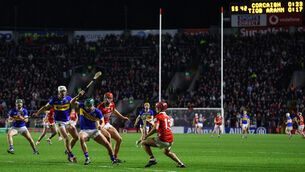Managers’ words can either arm or wound players
Enough has been written about Giovanni Trapattoni’s tactical conservatism that cost us a rare home win against fellow mid-tier European opposition: the non-introduction of Wes Hoolohan and the non-substitution of Conor Sammon, the substitution of Shane Long and the introduction of Paul Green.
What alarmed us most was a recent Kevin Kilbane revelation that during his time playing under the Italian, Trap hardly ever spoke at half-time.












